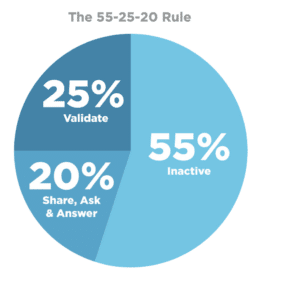Ready to level up your community reporting program? Whether you’re a solo practitioner or you lead a team of community professionals we have four ways you can immediately improve your community reporting program, opening the door to increased resourcing, support, and growth,
1. Make time for metrics.
We know you’re busy. Collecting, analyzing, and reporting metrics is a specialized skill many community managers don’t have time for but you either have to make the time, or outsource this work as community reporting is critical to the health and growth of you community program. . Maturing community programs should look for this skill beyond the core team to leverage existing expertise vs. trying to bring it in house. Community reporting ownership is increasingly moving to a specialized role on the community team, or in larger organizations, into a reporting organization that works across the company. While not every community has the budget for this, specialized reporting roles can lead to increased resources.
2. Understand the metrics’ audience and report accordingly.
What’s important to a business operations manager differs completely from that of an executive. Design reports with the end user in mind. Add a “why this is important” section to provide important contextual information. As communities mature, organizations want to see the value for the business (at a minimum), and the return on investment (ROI) – but the detail with which you provide this information can and should vary depending on your intended audience.
3. Flush out long-time inactive accounts.
Much like a database, communities should be cleaned up periodically. Remove people who haven’t returned to the community in a set time period (varies by community). Maintaining inactives can negatively impact your other metrics.
Community expert Dianne Kibbey, Global Head/VP of Community and Social Media at Newark Electronics shared this perspective:
Companies in general measure inactive members in very different ways, but it’s important to understand that an inactive member and a lurker are not the same. A lurker could be someone who’s indirectly active in the community, maybe they don’t engage in conversation, but they’re definitely aware of what’s going on at some point.
As an external community, we’re there to serve a purpose: getting an answer, downloading a piece of content. A member may find what they’re looking for, and they may then become inactive. We regularly clean up inactive [users] or try and re-engage them in another activity. It was a really interesting thing to see this year that everyone’s looking at these inactives and figuring out what to do about them, but it’s not necessarily a negative.
4. Get with the times.
Stop citing the 90-9-1 rule for community engagement. Instead, use the 55-25-20 Rule as a new benchmark. The 90-9-1 Rule, coined in 2006, explains behaviors exhibited in large online collaboration communities (like Wikipedia). It doesn’t apply to today’s niche topic or business use case focused communities. Instead, there’s a new engagement rule — backed by years of research — that better fits today’s online communities. Based on over a decade of research, a well- managed online community sees the following in a given month:

- 20% of members are actively creating content
- 25% are validating and consuming content
- 55% are inactive
Welcome to the new normal.
